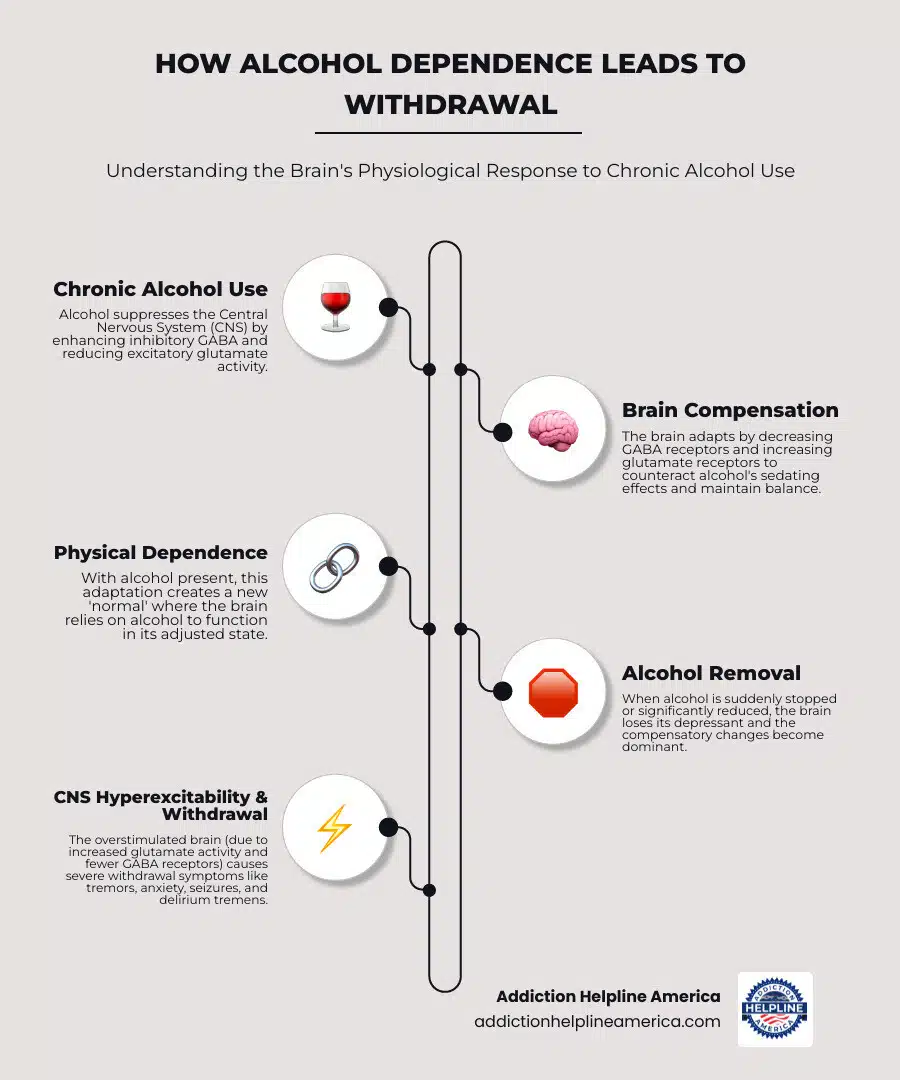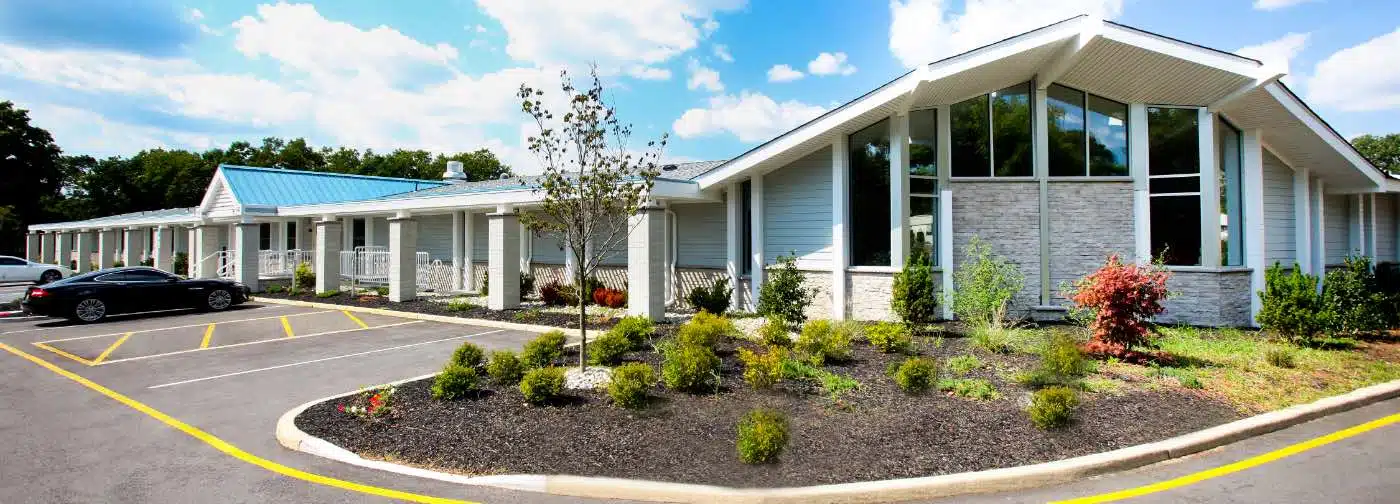Limited Availability: Treatment beds filling quickly. Call now for immediate placement – (844) 561-0606
Alcohol Detox is a medically supervised process for safely withdrawing from alcohol after prolonged heavy use. Here’s what you need to know:
Stopping suddenly after prolonged heavy drinking can trigger dangerous withdrawal symptoms. About 50% of people with alcohol use disorder experience withdrawal symptoms, and severe complications like delirium tremens (DTs) can be fatal in up to 10% of cases without medical treatment.
Medical detox makes the process safer and more comfortable. Providers use medication and monitoring to manage symptoms and prevent complications, addressing the physical dependence that is the first step toward recovery.
At Addiction Helpline America, we’ve guided thousands of individuals and families through the alcohol detox process, connecting them with compassionate medical professionals who specialize in safe withdrawal management and long-term recovery support. We understand how overwhelming this moment feels, and we’re here to help you steer it.

When you drink heavily over time, your brain adapts. Alcohol is a depressant, so your brain compensates by increasing its own stimulant activity to maintain balance. It ramps up excitatory neurotransmitters (like glutamate) and dials down inhibitory ones (like GABA). When you suddenly stop drinking, the depressant effect is gone, but your brain’s heightened activity remains. This hyperexcitability of the central nervous system is what causes withdrawal symptoms.
This is not a matter of willpower; it’s a powerful, and potentially dangerous, shift in brain chemistry that requires medical supervision. This overactive state can lead to increased heart rate, high blood pressure, and dehydration. For a deeper look at the science, see this scientific research on alcohol withdrawal syndrome.

Take the first step towards a healthier life! Call now to connect with our compassionate team and start your recovery journey today. Your path to healing awaits!
Our recovery specialists are available 24/7 to provide support, and all calls are confidential and free. Reach out anytime – we’re here to help!

Every person’s withdrawal experience is different, but a general pattern exists. The severity depends on factors like the duration and amount of alcohol use, age, and overall health.
In the first 6-12 hours after the last drink, early symptoms appear, including anxiety, headache, insomnia, nausea, sweating, and hand tremors (“the shakes”).
Between 12-24 hours, symptoms can intensify. Some people start experiencing hallucinations (visual, auditory, or tactile).
The 24-72 hour window is the peak risk period. Symptoms are most severe, with potential for high blood pressure, liftd heart rate, confusion, and seizures, which are a medical emergency.
After 72 hours, acute physical symptoms usually begin to subside, and the acute phase is often over within 5-7 days. However, some people experience Post-Acute Withdrawal Syndrome (PAWS), where psychological symptoms like mood swings, fatigue, and anxiety last for weeks or months. While not life-threatening, PAWS highlights the need for long-term support.
Some withdrawal symptoms are life-threatening and require immediate medical attention. Call 911 or go to an emergency room right away for these warning signs.
Delirium Tremens (DTs) is the most severe form of withdrawal, typically appearing 48 to 72 hours after the last drink. It involves severe confusion, agitation, fever, and terrifying hallucinations. According to statistics on Delirium Tremens mortality, DTs can be fatal without medical treatment.
Seizures, particularly grand mal seizures, are most common in the first 24-48 hours and indicate severe withdrawal.
Severe hallucinations that cause extreme fear, distress, or dangerous behavior require immediate evaluation.
Severe confusion and disorientation where the person can’t recognize their surroundings or loved ones is a serious sign.
Finally, a high fever or heart palpitations and irregular heartbeats are red flags that the body is in crisis.
If you see any of these symptoms, don’t hesitate. Medical intervention can prevent tragedy, which is the purpose of medically supervised alcohol detox.
The thought of detox can be overwhelming, but medical supervision makes it a safe, manageable process. You should not attempt it alone. The priorities of medical detox are safety, comfort, and preventing complications. Healthcare professionals monitor your physical and mental health, providing interventions as needed to build a foundation for recovery. Care often includes nutritional support and IV fluids for hydration, which significantly aids healing. A professional detox environment replaces fear with expertise and support.

Choosing the right alcohol detox program isn’t one-size-fits-all. The best option depends on your dependence severity, medical history, and support system. At Addiction Helpline America, we help you figure out which level of care is right for you.
At-home detox with professional guidance can work for mild-to-moderate dependence with a strong support system and no history of severe withdrawal. A healthcare professional provides remote care. While comfortable and less expensive, it requires self-discipline and lacks immediate medical help if symptoms worsen.
Outpatient detox offers a middle ground. You visit a clinic daily for monitoring and medication, then return home. This provides regular medical oversight while allowing you to maintain daily responsibilities. It’s best for those with mild-to-moderate dependence and a stable home.
Inpatient or residential detox provides 24/7 medical supervision and is the safest option for moderate-to-severe dependence, a history of complications, or an unstable home. It offers immediate medical care in a trigger-free, supportive environment. Though more costly, it can be lifesaving.
Research shows that for mild-to-moderate withdrawal, outpatient detox can be as safe and effective as inpatient care. Long-term outcomes are not significantly influenced by the detox setting; what truly matters is the comprehensive care and ongoing support you receive after detox ends.
The medications and monitoring used during alcohol detox are what make the process both safe and bearable. Your medical team has proven interventions to manage symptoms and prevent dangerous complications.
Benzodiazepines are the gold standard for management. Medications like Chlordiazepoxide (Librium), Diazepam (Valium), and Lorazepam (Ativan) calm the overactive central nervous system, reducing anxiety and preventing seizures. The choice of medication depends on your symptoms and liver function.
Beyond benzodiazepines, other medications may be used. Barbiturates like phenobarbital are for severe cases. Anticonvulsants help prevent seizures. Beta-blockers and other drugs can manage high blood pressure and heart rate, though they don’t prevent seizures.
To determine medication needs, providers often use the Clinical Institute Withdrawal Assessment for Alcohol, Revised (CIWA-Ar) scale. This tool allows for symptom-triggered therapy, where medication is given only when symptoms reach a certain level. This personalized strategy prevents over-medication and is supported by guidelines like the ASAM Clinical Practice Guideline on Alcohol Withdrawal Management.
Supportive care is also vital, including correcting nutritional deficiencies (especially thiamine), ensuring proper hydration, and providing a quiet, safe environment.
Walking into alcohol detox prepared can ease anxiety and set you up for success.
Start with an honest medical consultation. Be completely transparent with a healthcare provider about your alcohol use and medical history. This allows them to assess your risk, recommend the safest detox setting, and create a personalized plan.
Clear your calendar. Arrange for time off from work and other responsibilities to focus on your health without the stress of deadlines.
Rally your support system. Tell trusted family or friends about your decision. Their encouragement is vital. If you’re doing at-home detox, arrange for someone to stay with you for support and safety.
Pack thoughtfully if you’re going inpatient. If heading to a facility, pack about a week’s worth of comfortable clothing, personal hygiene items, and contact information. Leave valuables at home.
Prepare yourself mentally. Understand that detox is challenging but temporary. Set realistic expectations and remind yourself of your reasons for quitting to stay committed when it gets tough.
Think about what comes next. Detox is just the beginning. Start planning for therapy, support groups, or aftercare programs you might join. A clear path forward helps prevent relapse.
At Addiction Helpline America, we provide free, confidential, personalized guidance to help you steer these preparation steps. We’ll connect you with medical professionals who specialize in safe withdrawal management and can walk you through exactly what to expect. You don’t have to figure this out alone—we’re here to help.
Completing alcohol detox is a courageous first step, but it’s the start of a marathon, not the finish line. Detox addresses the physical dependence, but the psychological pull of addiction remains. Cravings, triggers, and old habits don’t disappear once alcohol is out of your system. Building a strong foundation for sobriety through ongoing treatment and support is essential for preventing relapse and achieving long-term recovery.

Take the first step towards a healthier life! Call now to connect with our compassionate team and start your recovery journey today. Your path to healing awaits!
Our recovery specialists are available 24/7 to provide support, and all calls are confidential and free. Reach out anytime – we’re here to help!

Think of therapy as your toolkit for building a new life. It helps you understand what drove you to drink and develop healthier ways to handle life’s challenges.
Cognitive Behavioral Therapy (CBT) is a highly effective approach. It helps you identify and change negative thought patterns and behaviors related to drinking, teaching you practical strategies to manage triggers.
Individual counseling provides a private, judgment-free space to explore underlying issues like trauma, grief, or shame that may be connected to your drinking. This personalized approach addresses your specific challenges.
Family therapy recognizes that addiction affects everyone. These sessions help repair relationships, rebuild trust, and teach your family how to support your recovery in healthy ways.
Many people also face co-occurring mental health conditions like depression or anxiety. Addressing these issues through therapy is not optional for lasting recovery; treating both conditions together dramatically improves your chances of success.
Nobody recovers alone. Surrounding yourself with support is key to staying grounded.
Support groups offer connection with people who truly understand. Alcoholics Anonymous (AA) uses a 12-step program, while SMART Recovery provides science-based tools. Finding what resonates with you is what’s important.
Family members need support too. Al-Anon and similar resources provide a confidential space for loved ones to share experiences and learn coping strategies.
Sober living environments can bridge the gap between intensive treatment and independent life. These substance-free homes provide structure, accountability, and peer support.
Aftercare programs are your safety net. Many treatment centers offer ongoing support like therapy and relapse prevention planning to help you stay on track.
We know finding the right support can feel overwhelming. That’s why Addiction Helpline America exists. We connect you with the resources you need, whether that’s finding a support group near you or learning about recovery resources available through our network. Our guidance is free, confidential, and personalized to your situation.
We know you probably have questions about alcohol detox. Here are some of the most common questions we hear, with straightforward answers.
The only real way to prevent alcohol withdrawal is to avoid developing physical dependence in the first place. Once dependence exists, withdrawal will occur if you stop drinking. However, the severe and dangerous complications of withdrawal can be prevented. That’s where medical help during a supervised alcohol detox makes all the difference. With professional support, you can manage withdrawal safely and comfortably. Please don’t try to stop drinking “cold turkey” on your own if you’ve been drinking heavily; it’s not worth the risk.
This is critical information. Call 911 or get to the nearest emergency room immediately for any of the following symptoms:
These symptoms are life-threatening. Don’t wait to see if they get better. Get help right away.
The timeline depends on your unique situation. For most, acute physical withdrawal symptoms begin within 6-12 hours, peak between 24-72 hours, and subside within 5-7 days. Factors like heavy, long-term use can extend this period.
Even after physical symptoms fade, psychological symptoms can linger. This is called Post-Acute Withdrawal Syndrome (PAWS), and it can include anxiety, insomnia, and mood swings for weeks or months. These symptoms aren’t dangerous, but they are challenging and show why ongoing support is vital.
These symptoms do get better with time and the right support. At Addiction Helpline America, we’re here to answer any other questions you might have and connect you with the right resources for your journey. You don’t have to figure this out alone
If you’ve made it this far, we want you to know something important: you’re already taking a courageous step just by seeking information and considering change. We understand that the idea of alcohol detox can feel overwhelming—maybe even frightening. But here’s what we’ve learned from helping thousands of people just like you: detox is a manageable first step, and with the right support, long-term recovery is not just possible—it’s happening for millions of people every single day.
Let’s be clear about what detox really is. It’s the process of safely clearing alcohol from your body while medical professionals help manage withdrawal symptoms. It typically takes 3-10 days for the acute phase, though some effects may linger longer. Detox addresses the physical side of dependence, which is crucial, but it’s just the beginning. The real work of building a fulfilling, alcohol-free life happens in the weeks, months, and years that follow, through therapy, support systems, and the daily choice to move forward.
You don’t need to have all the answers right now. You don’t need to know exactly which type of program is right for you, or whether you need inpatient or outpatient care. That’s where we come in.
At Addiction Helpline America, we provide free, confidential, and personalized guidance to help you steer these decisions. We’re not here to judge or pressure you. We’re here to listen to your unique situation—your concerns, your medical history, your support system, your financial considerations—and connect you with reputable, medically supervised detox centers and comprehensive recovery programs from our vast network. We’ve built relationships with treatment providers across the country specifically so we can match you with the care that fits your needs.
Maybe you’re reading this for yourself. Maybe you’re here because someone you love is struggling. Either way, you don’t have to face this alone. Recovery is built on connection—to professionals who understand addiction medicine, to peers who’ve walked this path, and to family and friends who want to support you.
The truth is, the hardest part is often just reaching out. Once you do, things start to feel more manageable. You’ll have a team in your corner. You’ll have a plan. You’ll have hope.
Take that brave first step today. Find a personalized alcohol detox and recovery program today. Your future self will thank you for it.
Are you or a loved one struggling with addiction? Call today to speak to a treatment expert.
For anyone seeking help for addiction for themselves or a loved one calls to Addiction Helpline America are completely confidential and available 24/7.
Please note: any treatment center listed on our site that receives calls is a paid advertiser.
Calls to a specific treatment center’s listing will be connected directly to that center.
Calls to our general helpline will be answered by treatment providers, all of whom are paid advertisers.
By calling the helpline, you agree to our terms and conditions. These calls are free of charge and carry no obligation to enter treatment. Neither Sober Steps nor anyone answering your call receives a commission or fee based on your choice of treatment provider.
If you’d like to explore additional treatment options or connect with a specific rehab center, you can browse our top-rated listings, visit our homepage, or call us at (844) 561-0606. You may also contact us for further assistance.
Calls to any general helpline will be answered or returned by one of the treatment providers listed, each of which is a paid advertiser:
Our helpline is available 24 hours a day, 7 days a week at no cost to you and with no obligation for you to enter into treatment. We are committed to providing support and guidance whenever you need it.
In some cases, Addiction Helpline America charges our verified partner a modest cost per call. This fee helps us cover the costs of building and maintaining our website, ensuring that we can continue to offer this valuable service to those in need.